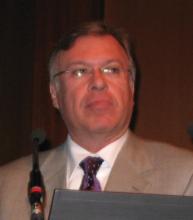AMSTERDAM – Video-assisted thoracoscopic surgery worked as well as open lobectomy for 5-year survival in early-stage lung cancer, based on a secondary analysis of nonrandomized patients who underwent surgery as part of a multicenter trial.
"These data demonstrate that VATS, when properly done, can achieve long-term survival that is similar to open lobectomy," Dr. Walter J. Scott said at the World Conference on Lung Cancer. He stressed that study included only patients with early-stage lung cancer that was either node negative or had nonhilar N1 disease, and hence the finding is specific for only these patients. Until now, questions existed about the oncologic efficacy of VATS, noted Dr. Scott, chief of the division of thoracic surgery at Fox Chase Cancer Center in Philadelphia.But "VATS lobectomy provides comparable oncologic outcomes" for this group of patients, he said.
His analysis used data collected from 964 lung cancer patients who participated in a multicenter study during 1999-2004 that compared two different strategies for lymph node assessment in early-stage lung cancer (Ann. Thorac. Surg. 2006;81:1013-20). Although most surgeons did not perform VATS during this time, a few surgeons did, and 5-year outcome results were available for 66 patients in the study underwent VATS. Five-year data also existed for 898 of the patients who underwent open lobectomy.
To adjust for baseline differences among the patients, Dr. Scott and his associates ran a propensity score analysis that took into account age, sex, performance status, tumor histology, location, and tumor size and invasion. The analysis excluded about a fifth of the open lobectomy patients because their propensity scores fell outside the range of the VATS patients, so the final survival comparison included 66 VATS and 686 open lobectomy patients.
With propensity adjustment, the results showed no significant differences between the VATS and open lobectomy patients in their 5-year rates of overall survival, disease-free survival, local disease-free survival, or freedom from new primary tumors (see table), Dr. Scott reported at the meeting, which was sponsored by the International Association for the Study of Lung Cancer.
Dr. Scott said that he is a shareholder in Biogen Idec, Celgene, and Johnson & Johnson.


